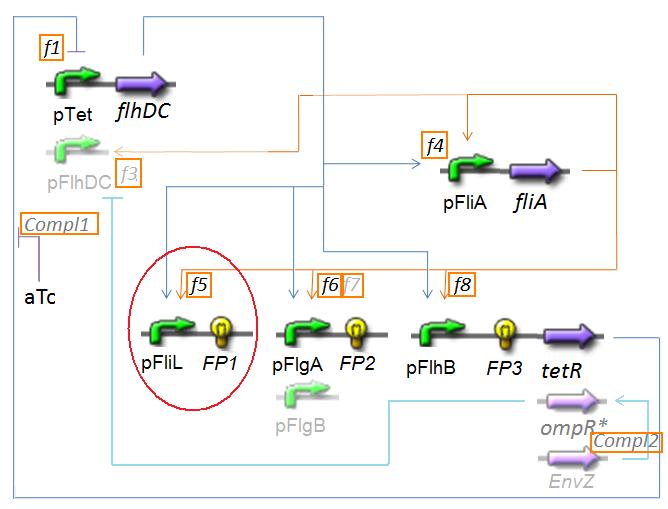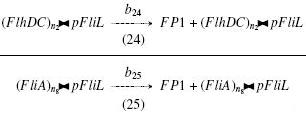Team:Paris/Modeling/Molecular Reactions
From 2008.igem.org
(Difference between revisions)
| Line 19: | Line 19: | ||
<html><iframe height="300" width="600" src="https://static.igem.org/mediawiki/2008/3/3a/Complexation_Reactions.pdf"></iframe></html> | <html><iframe height="300" width="600" src="https://static.igem.org/mediawiki/2008/3/3a/Complexation_Reactions.pdf"></iframe></html> | ||
| - | | width="25%" | '''On the Example''' <br> | + | | width="25%" | '''On the Example :''' <br> |
| + | How given amounts of ''FlhDC'' and ''FliA'' would produce ''FP1'' ? <br> | ||
| + | <br> | ||
The complexation of ''FlhDC'' on ''pFliL'' : <br> | The complexation of ''FlhDC'' on ''pFliL'' : <br> | ||
[[Image:DCiLcompl.jpg]] | [[Image:DCiLcompl.jpg]] | ||
| Line 32: | Line 34: | ||
<html><iframe height="300" width="600" src="https://static.igem.org/mediawiki/2008/e/ef/Production_Reactions.pdf"></iframe></html> | <html><iframe height="300" width="600" src="https://static.igem.org/mediawiki/2008/e/ef/Production_Reactions.pdf"></iframe></html> | ||
| - | | width="25%" | '''On the Example''' <br> | + | | width="25%" | '''On the Example :''' <br> |
| - | + | How given amounts of ''FlhDC'' and ''FliA'' would produce ''FP1'' ? <br> | |
| + | <br> | ||
| + | ''FlhDC><pFliL'' and ''FliA><pFliL'' causes "production" of ''FP1'' : <br> | ||
| + | <br> <br> | ||
[[Image:bFP1.jpg]] | [[Image:bFP1.jpg]] | ||
| Line 41: | Line 46: | ||
<html><iframe height="300" width="600" src="https://static.igem.org/mediawiki/2008/f/f7/Degradation_Dilution.pdf"></iframe></html> | <html><iframe height="300" width="600" src="https://static.igem.org/mediawiki/2008/f/f7/Degradation_Dilution.pdf"></iframe></html> | ||
| - | | width="25%" | '''On the Example''' <br> | + | | width="25%" | '''On the Example :''' <br> |
| - | + | How given amounts of ''FlhDC'' and ''FliA'' would produce ''FP1'' ? <br> | |
| + | <br> | ||
| + | ''FP1'' disappears because of its degradation and dilution : <br> | ||
[[Image:dFP1.jpg]] | [[Image:dFP1.jpg]] | ||
Revision as of 19:43, 26 October 2008
|
Molecular Reactions
We show here the elementary reactions from wich we started. They intend to be "exhaustives" in the sense that every steps of the System is described. Each of those reactions has to be "mathematically interpreted", in a Model (see the model) that accounts for the important phenomenon, and in the same time allows us to find experimentally (see the protocol) every involved parameters.
for complete .pdf with all reactions and references : [list of reactions/equations]
|
 "
"





